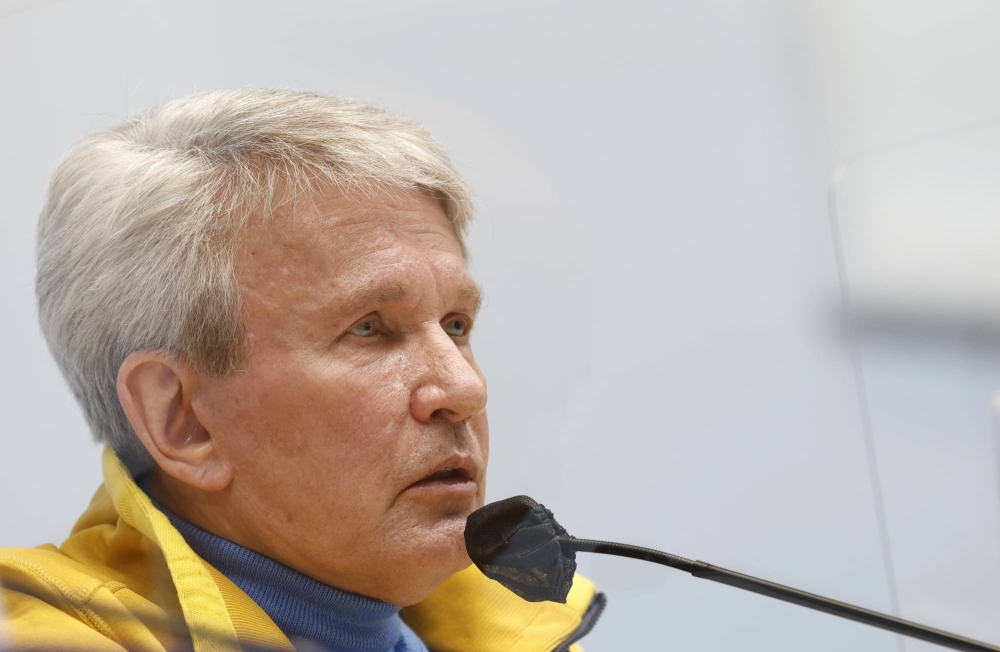As the Paris Summer Olympics and Paralympics draw ever nearer, the participation of Russian athletes continues to be a hot-button issue for war-torn Ukraine.
Russia and its ally Belarus are set to compete in Paris under a neutral flag after a vote to ban them outright due to the invasion of Ukraine was narrowly defeated in September.
But Ukrainian sports leaders continue to push for a U-turn.
The International Paralympic Committee (IPC) is “aware of numerous specific violations of the IPC Constitution” by the Russian Paralympic Committee and should ban Russia and Belarus from the 2024 Paralympics, the president of the Ukrainian Paralympic body has said.
The vote at the IPC’s General Assembly in Manama, Bahrain, resulted in 74 members opposed to an outright ban, 65 in favor and 13 abstentions.
Ukrainian Paralympic Committee President Valeriy Sushkevych said the vote was tainted, claiming some delegates from African countries told him “there was significant political pressure from Russia through embassies and governments.”
Sushkevych says he has “new facts” that reveal the extent of the Russian Paralympic Committee’s support for the war in Ukraine and their efforts to integrate para athletes in land occupied by Russia into their team.
“We are preparing information for the IPC on new facts that vividly demonstrate the Russian Paralympic movement is an active participant in the implementation of Russia’s deadly special military operation,” he said.
The Games run from Aug. 28 to Sept. 8, after the Olympics.
Sushkevych, 59, said that, among the illegal acts, was the inclusion of Russian soldiers wounded since the invasion.
His Russian counterpart Pavel Rozhkov has announced that veterans are being selected for Russian Paralympic teams.
“The Russian Paralympic Committee and the Russian authorities actively integrate members of the Russian army, who killed Ukrainian children, assaulted Ukrainian women, and destroyed hundreds of peaceful towns and villages on Ukrainian territory,” said Sushkevych.
He claimed that not only were Ukrainian athletes appalled at competing against former soldiers, so were others in the Paralympian community.
“Some European countries are already asking IPC leaders: do you really think that our athletes want to live in the same Paralympic village with these killers and rapists?
“Even be alongside them on the same podium during award ceremonies?”
Other potential evidence of infractions could include the creation of a new sport organization for disabled people in the occupied territory of the Donetsk region, spearheaded by Russian Paralympic champion Olga Semenova.
Sushkevych, who with his family had to leave their home due to “Russian rocket attacks,” is confident the extraordinary General Assembly of European Paralympic committees in Latvia next year will be decisive.
“Decisions are planned that should effectively influence the leadership of the IPC, in accordance with the IPC Constitution, to prevent Russia and Belarus from participating in the Paralympics in Paris in any capacity,” he said.
The IPC declined to comment on the allegations but directed questions to the words of its president, Andrew Parsons, after the Manama vote allowing Russians and Belarusians to compete at the Paralympics, when he said: “As this was a decision taken by the IPC General Assembly, I expect all IPC members to fully respect it.”
The conflict has inflicted destruction and suffering on Ukrainian Paralympians.
“Over 100 homes where our Paralympians lived have been destroyed,” said Sushkevych.
“Dozens of Ukrainian Paralympians now reside in western regions of Ukraine and abroad, in various European countries, in temporary residences.
“There are Paralympic athletes who have personally suffered from bombings, shelling, and violence in the occupied territories.”
The grandparents of four-time swimming Paralympic medalist Anton Kol have fled due to constant shelling in the Nikopol region.
The 33-year-old said that focusing on training and competing was “very difficult” and he was “constantly under stress and fear for my family.”
The triple world champion has found little compassion being expressed by either his Russian or Belarusian rivals.
Kol’s fellow Paralympian, five-time world para-canoeing champion Marina Mazhula, has family in Russia and said their relations remain good.
The 40-year-old, who has suffered the loss of a friend and whose nephew Oleksandr has been wounded twice on the front line, said that she can’t wait to compete against the Russians and Belarusians if they are in Paris.
“I will ‘fight’ for my country wherever I can!” she said.
“The sports arena will become my front line. Not showing up at the Paralympics would be seen as a sign of weakness.
“We cannot surrender our country without a fight, and medals should not be handed over without a struggle.”

